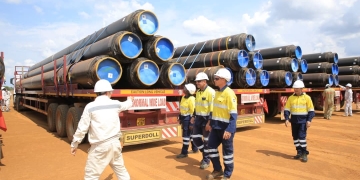
The Ugandan government and Vitol Bahrain E.C., a Bahrain-based company, have chosen the port of Dar es Salaam to import oil, as part of efforts to promote economic relations between Tanzania and Uganda.
The decision was made a few days after Vitol Bahrain E.C. secured a permit from the Uganda National Oil Company (UNOC) to supply oil in Uganda.
Uganda currently imports 90 percent of her fuel through Kenya argues that Kenya dropped a transparent and price-competitive open tendering system for the Gulf deal without consultation.
Vitol Bahrain E.C. has also committed to financing the construction of additional capacity in partnership with UNOC, adding 320 million liters of storage capacity at Namwambula, Mpigi.
Dr Nankabirwa described Vitol Bahrain E.C. as a strong partner (with a turnover of $505 billion in 2022) and an independent global trader with a strong regional presence. She also said the company is committed to building the capacity of UNOC.
Earlier this year, the Ugandan government decided to have UNOC help the government improve its “products’ stock- holding levels within the country and subsequently contribute to the stabilisation of the consumer and retail fue prices,” as part of the implementation of the 2003 Petroleum Supply Law, which was revised in 2023.
Dr Nankabirwa, who led a special delegation from President Yoweri Kaguta Museveni to Tanzania on November 5, 2023, expressed gratitude to President Samia Hassan Suluhu’s leadership and promised cooperation between the two countries in the energy sector.
Uganda chose the port of Dar es Salaam based on the port’s efficiency and its good system for the importation of petroleum and gas energy.
Last week it emerged that Uganda was upset that it was kept in the dark about the negotiations around the government-to- government fuel deal between Kenya and two Gulf nations.
At meetings held last week, representatives of Uganda’s Ministry of Energy, the Uganda National Oil Company (Unoc) and Kenya oil marketers observed that the decision by Kenya to enter into the Gulf deal had left Uganda’s supplies vulnerable and exposed its citizens to expensive pump prices.
According to Ugandan Energy and Mineral Development Minister Dr Ruth Nankabirwa Ssentamu, UNOC and Vitol Bahrain E.C. have negotiated a five-year contract.
The partnership will be financed by Vitol Bahrain E.C., which will provide a working capital facility backed by its global balance sheet and work with UNOC to ensure competitive pricing of petroleum products.
Vitol Bahrain E.C. has also committed to financing the construction of additional capacity in partnership with UNOC, adding 320 million liters of storage capacity at Namwambula, Mpigi.
Dr Nankabirwa described Vitol Bahrain E.C. as a strong partner (with a turnover of $505 billion in 2022) and an independent global trader with a strong regional presence. She also said the company is committed to building the capacity of UNOC.
Earlier this year, the Ugandan government decided to have UNOC help the government improve its “products’ stock- holding levels within the country and subsequently contribute to the stabilisation of the consumer and retail fuel prices,” as part of the implementation of the 2003 Petroleum Supply Law, which was revised in 2023.
Dr Nankabirwa, who led a special delegation from President Yoweri Kaguta Museveni to Tanzania on November 5, 2023, expressed gratitude to President Samia Hassan Suluhu’s leadership and promised cooperation between the two countries in the energy sector.
Uganda chose the port of Dar es Salaam based on the port’s efficiency and its good system for the importation of petroleum and gas energy.
The government believes that the step will ensure the availability of oil in Uganda and the whole of the East African region.
Uganda’s decision also offers the country the chance to battle Kenya for the South Sudan, Rwanda and Congo DR fuel markets.

















